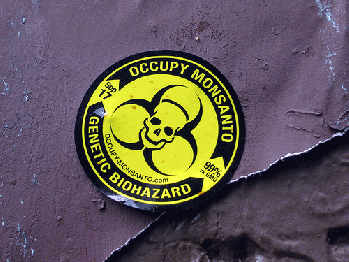Reprinted from Smirking Chimp
On Friday, President Obama signed bill S.764 into law, dealing a major blow to the movement to require GMO labeling. The new law, called the "Deny Americans the Right to Know" (DARK) Act by food safety groups, has at least three key parts in it that undermine Vermont's popular GMO labeling bill and make it nearly impossible for you and me to know what's in our food.
The law claims to set a federal labeling standard by requiring food producers to include either a QR bar code that can be scanned with a phone, or a 1-800 number that consumers can call to find out whether a product contains genetically modified ingredients.
But according to the Institute for Responsible Technology, this bill doesn't require most processed foods to have a label, the bill defines genetic engineering so narrowly that most GMOs on the market don't qualify, and the bill gives the USDA two more years to come up with "additional criteria" -- also known as "more loopholes."
This is disappointing for American consumers who honestly just want to know what their food contains, but the issue surrounding GMOs isn't just about what these companies are putting into our food and stocking our stores with. What's potentially more devastating for the planet is that genetically modified organisms developed by companies like Monsanto and DuPont can escape into our ecosystems and potentially wreak havoc before they are even tested or approved as safe.
That's not wild-eyed conspiracy theory or speculation, it's a matter of fact.
On Friday, the same day that Obama signed the DARK Act, the US Department of Agriculture confirmed that a farmer found 22 experimental and unapproved wheat plants in one of his fields that had been genetically modified by Monsanto. The reactions to the finding have been swift, despite being ignored by the mainstream media.
Federal and state investigators announced that they are looking into the matter of how the unapproved mutant wheat found its way to a field that hasn't been planted since 2015.
South Korea, the fifth-largest market for US wheat, announced in response that it will be stepping up quarantine measures for milling and feed wheat shipments from the US in response.
Monsanto told The Associated Press that these wheat plants are a type that was evaluated in limited field trials in the Pacific Northwest from 1998 to 2001, but the variety was never approved.
Nonetheless, this is the third time in as many years that varieties of Monsanto's GMO Roundup-ready wheat has cropped up in the area.
In two of those cases, federal officials have no idea how the wheat got into the field or where else it might have spread to.
All we do know is that the USDA is testing the farmer's other fields to see if the wheat is growing anywhere else, and that the FDA has stated that there is no evidence that the wheat has entered the market. Beyond that, we really don't know how this Round-up ready wheat will impact local ecosystems, whether it will wipe out non-GMO wheat, or whether it could bio-accumulate in the food chain and eventually have an impact on top predators, like humans.
That should set off some alarm bells, because we've dodged a similar bullet before with Klebsiella planticola, a soil bacteria that aggressively grows on plants' roots.
In the early 1990s, a European genetic engineering company was preparing to field test its genetically modified version of Klebsiella planticola, which it had tested in the lab and presumed to be safe. But if it weren't for the work of a team of independent scientists led by Dr. Elaine Ingham, that company could have literally killed every terrestrial plant on the planet.
(Note: You can view every article as one long page if you sign up as an Advocate Member, or higher).






